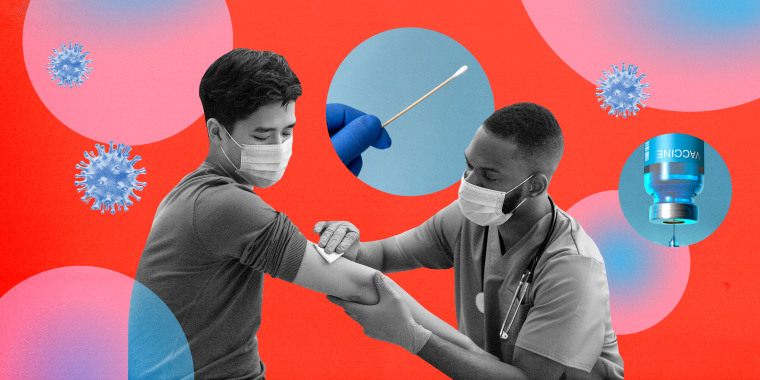Fully-vaccinated people — those who are at least two weeks out from their second dose of the Moderna or Pfizer-BioNTech vaccines or one dose of the Johnson & Johnson vaccine — should feel safe resuming most activities without masks or social distancing.
However, one important element of controlling the pandemic is still going to be key: Testing. While fully vaccinated people may not need to test as often, there are still some situations where it could be important to get a coronavirus test.
Should you get tested if you've been exposed to COVID-19?
According to the Centers for Disease Control and Prevention (CDC), a fully vaccinated person can "refrain from quarantine and testing following a known exposure" so long as they stay asymptomatic. If a person develops COVID-19 symptoms following exposure, they should be tested even if they are vaccinated.
Dr. Gigi Kwik Gronvall, a senior scholar at the Johns Hopkins Center for Health Security at the Johns Hopkins Bloomberg School of Public Health, agreed that if you have a known exposure, you "don't have to" get tested or quarantine.
"For most people who are vaccinated, the risks of them contracting COVID are pretty, pretty low," Gronvall said, noting the success of the vaccines currently in use. "... If you were to be exposed to it, the virus has a chance to try and replicate, but your body shuts that down. ... I'm not saying it can't happen, but it's very, very unlikely."
Dr. Lucian Davis, an associate professor of epidemiology at the Yale School of Public Health in New Haven, Connecticut, also said that people who are fully vaccinated don't need to worry about testing, pointing to the downsides.
"As the proportion of people at risk goes down as individuals get vaccinated, we know that their risk of getting sick is much less and there are some downsides to getting tested, there's the cost and the trouble of going and the worry if you happen to get a false positive test," said Davis.
Both Gronvall and Davis recommended that people do take their specific situations into account when deciding whether or not to seek out testing: If you work with high-risk people who aren't vaccinated or live with an unvaccinated family member, it might be worth getting tested following a confirmed exposure.
Should you get tested if you feel sick?
If you start having symptoms of COVID-19, whether or not you have a confirmed exposure to the virus, Davis and Gronvall both recommend getting tested.
"If you get sick, you definitely should get tested because, while those symptoms might not be related to COVID, if they were, you'd want to know and you'd definitely want to prevent transmission to other people and take care of yourself," said Davis, noting that no vaccine is perfect and that there are breakthrough cases. "If you're feeling sick, definitely get tested."
Should you get tested before traveling?
According to the CDC, people who are fully vaccinated can resume both domestic and international travel and do not need to get tested or quarantine either before or after their trips, though some international destinations may require travelers to show proof of a negative test. Masks are required on airplanes, trains, buses and all other forms of public transportation within the U.S.
Airlines and cruise lines may also require proof of a negative test, regardless of vaccination status.
"In the case of airlines, I think (testing) is making people feel comfortable to come back and get on board, and so they may continue to have this requirement for some period of time," said Davis. "It's probably going to be a condition of participating in (travel)."
However, if your airline doesn't require it and you aren't showing symptoms of COVID-19, Davis said that people likely don't need to test themselves before travel.
"It comes down to risk, and if you've been vaccinated, your risk isn't going to be very high," Davis said.
Related:

